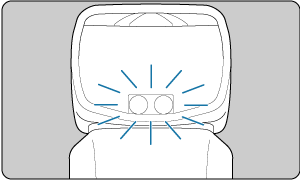E-TTL II / E-TTL Autoflash, by Shooting Mode
E-TTL II or E-TTL autoflash suitable for the current shooting mode is used automatically – simply set the camera shooting mode to (shutter-priority AE),
(aperture-priority AE),
(flexible-priority AE), or
(manual exposure).
|
Select this mode when you want to set the shutter speed manually. The camera sets a suitable aperture value for the shutter speed to obtain standard exposure based on metering by the camera.
|
|
|
Select this mode when you want to set the aperture value manually. The camera sets a suitable shutter speed for the aperture value to obtain standard exposure based on metering by the camera.
|
|
|
Any shutter speed or aperture value can be set.
|
|
|
Select this mode if you want to set both the shutter speed and aperture value manually. Light from the flash provides standard exposure for subjects. Background exposure varies depending on your specified shutter speed and aperture value. |
Flash sync speed and aperture value, by shooting mode
| Shutter Speed | Aperture Value | |
|---|---|---|
| Set automatically (1/X sec. to 1/60 sec.)*1 | Set automatically | |
| Manually set (1/X sec. to 30 sec.) | Set automatically | |
| Set automatically (1/X sec. to 1/60 sec.)*1 | Set manually | |
| Set manually / automatically (at least 1/X sec.) | Set manually / automatically | |
| Set manually (1/X sec. to 30 sec., Bulb) | Set manually |
1/X sec. represents the camera's maximum flash sync shutter speed.
1: On cameras that support slow synchro, varies by settings.
Auto Zoom for Sensor Size
The Speedlite automatically recognizes the image sensor size of the EOS Digital camera and sets optimal flash coverage for the effective shooting angle of view of the lens in a focal length range of 24–200 mm.
Transmission of Color Temperature Information
This feature provides optimal white balance in flash photography by using color temperature information at the moment of firing, which is transmitted by the Speedlite to the EOS Digital camera. It is automatically enabled when camera white balance is set to ,
, or
.
AF-Assist Beam

The Speedlite's built-in LED AF-assist beam automatically fires to assist with autofocusing in low-light scenes.
As for compatible angles of view, the AF-assist beam is effective for lens focal lengths of 24 mm and longer, and the effective range is approx. 0.6–10 m (2.0–32.8 ft.) at the center of the AF area.
Caution
- Focusing with the AF-assist beam of an external Speedlite may be difficult when using a peripheral AF point on the camera, or when using wide-angle or telephoto lenses. In this case, use the center AF point or an AF point near the center.
Note
- AF-assist beam firing can be disabled in C.Fn-08.
- Flash output is fixed for the EOS R3, EOS R7, and EOS R10. For other cameras with a multi-function shoe, flash output is automatically adjusted to suit brightness.
- Depending on ambient brightness, the AF-assist beam automatically switches to intermittent flash firing for the EOS R3, EOS R7, and EOS R10. For other cameras with a multi-function shoe, increases of internal temperature automatically reduce brightness of the LED AF-assist beam or switch to intermittent flash firing, for safety. Note that this beam may be emitted by the camera instead of by the Speedlite, depending on ambient brightness.